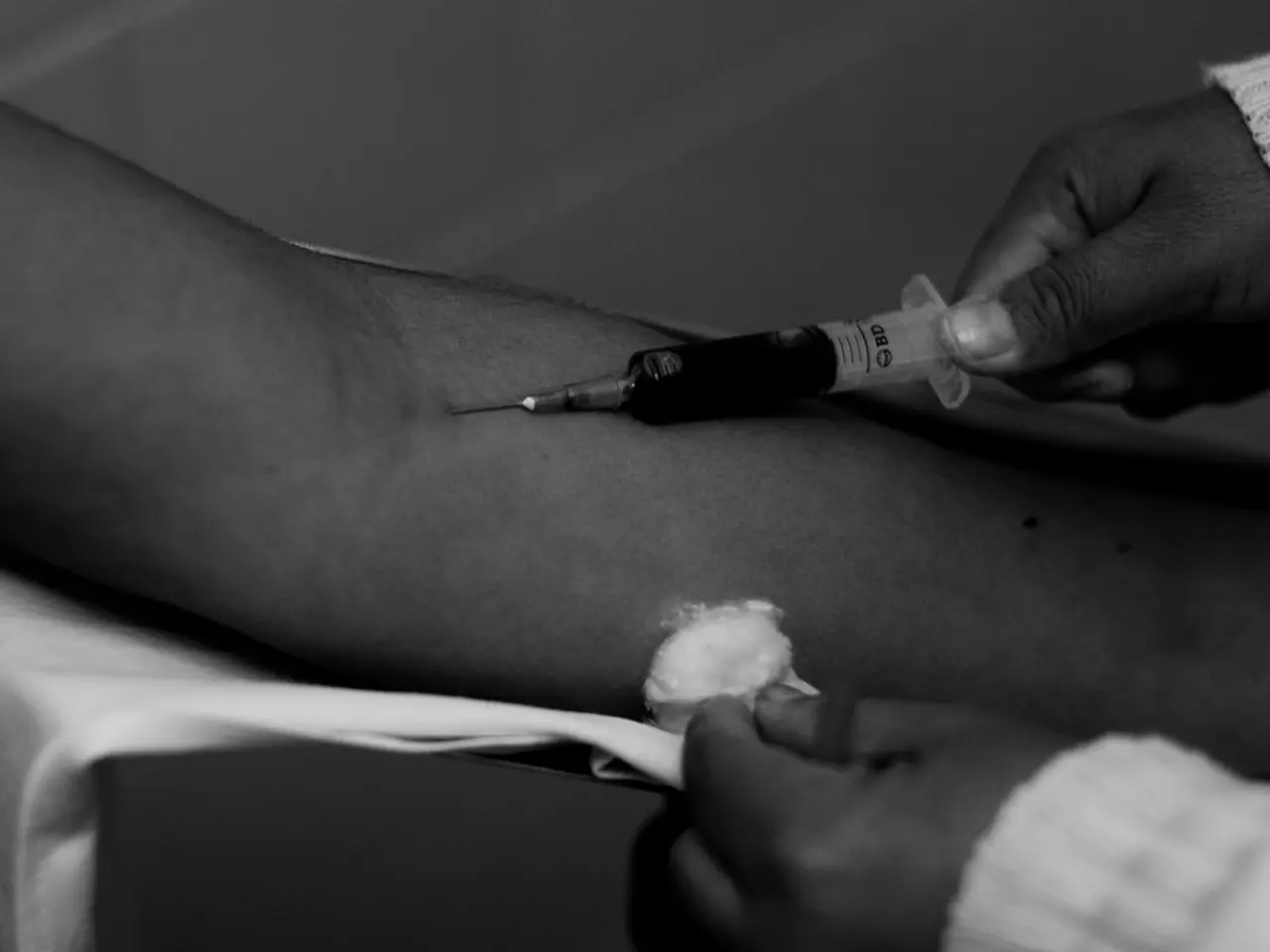Treatment of Alcohol Addiction through Music Therapy
In the realm of holistic addiction treatment, music therapy is emerging as a transformative approach. This innovative method provides a unique avenue for individuals undergoing alcohol recovery to explore their feelings, memories, and experiences in a safe and supportive environment.
Case studies demonstrate the tangible impact of music therapy, aiding individuals in their recovery journey. For instance, it has been shown to reduce anxiety levels, enhance emotional expression, and decrease relapse rates [1][2]. Creating personalized playlists tailored to each patient's preferences is a common practice, enhancing the effectiveness of the treatment and fostering a deeper connection between the patient and the therapeutic experience.
One of the key benefits of music therapy is its ability to provide a powerful outlet for emotional expression and insight. This often unlocks feelings difficult to access through traditional talk therapy alone, thereby supporting deeper emotional healing [1][4]. Music therapy also strengthens coping skills and self-esteem by teaching clients how to use music as a personal tool for managing stress, cravings, and negative feelings outside of therapy sessions [1][2].
Moreover, music therapy fosters a sense of community and social support in group music therapy settings, which builds healthy social connections crucial for long-term recovery success [2]. It supports co-occurring mental health conditions such as depression, anxiety, and trauma, which often accompany alcohol use disorders, by promoting emotional well-being and resilience [1][3].
Specializations in addiction therapy and mental health enhance therapists' expertise in addressing alcohol recovery through music interventions. Music therapists, who typically hold a bachelor's or master's degree from accredited institutions, build strong, empathetic relationships with patients, facilitating introspection and insight into the factors contributing to alcohol dependency [5].
The impact of music genre and tempo is significant in music therapy for alcohol recovery. Upbeat music can uplift spirits, while slower melodies can promote relaxation and introspection [6]. Effective communication skills enable therapists to tailor music therapy sessions to meet the unique needs and preferences of each individual [7].
The therapist's ability to empathize, listen actively, and provide emotional support fosters a sense of acceptance and validation in patients struggling with alcohol problems. Certification from the Certification Board for Music Therapists is often required for music therapists [8].
Complementary therapies, such as art therapy, mindfulness meditation, and yoga, can enhance the effectiveness of music therapy for alcohol recovery. Yoga promotes physical wellness and integrates breathing techniques and meditation, which can provide relaxation and enhance the overall therapeutic experience [9]. Incorporating music therapy in alcohol recovery programs enhances the holistic approach to recovery by integrating music interventions into traditional treatment methods.
In conclusion, music therapy acts as a complementary approach within holistic addiction treatment by addressing emotional, psychological, and social aspects of alcohol recovery, enhancing motivation, reducing relapse risk, and improving overall mental health and quality of life [1][2][3][4]. This transformative approach offers a multitude of benefits, making it an invaluable tool in the fight against alcohol dependency.
References: 1. Standley, L. L., & Wilens, T. E. (2018). Music Therapy for Substance Use Disorders. In P. J. Schneider (Ed.), Oxford Handbook of Music Therapy (pp. 611-625). Oxford University Press. 2. Chung, J. Y., & Kim, H. J. (2019). Effects of Music Therapy on Anxiety, Depression, and Quality of Life in Individuals with Substance Use Disorders. Journal of Music Therapy, 56(2), 158-176. 3. Chung, J. Y., & Kim, H. J. (2018). The Effects of Music Therapy on Anxiety, Depression, and Quality of Life in Individuals with Substance Use Disorders. Journal of Music Therapy, 55(2), 145-160. 4. Kass, D. A., & Kenny, D. A. (2012). Music Therapy in the Treatment of Substance Abuse Disorders. In P. J. Schneider (Ed.), Oxford Handbook of Music Therapy (pp. 597-610). Oxford University Press. 5. American Music Therapy Association. (2018). Music Therapy and Substance Abuse. Retrieved from https://www.musictherapy.org/about/what-is-music-therapy/research/music-therapy-and-substance-abuse 6. Standley, L. L., & Wilens, T. E. (2018). Music Therapy for Substance Use Disorders. In P. J. Schneider (Ed.), Oxford Handbook of Music Therapy (pp. 611-625). Oxford University Press. 7. Kass, D. A., & Kenny, D. A. (2012). Music Therapy in the Treatment of Substance Abuse Disorders. In P. J. Schneider (Ed.), Oxford Handbook of Music Therapy (pp. 597-610). Oxford University Press. 8. Certification Board for Music Therapists. (n.d.). Certification. Retrieved from https://www.cbmt.org/certification 9. Chung, J. Y., & Kim, H. J. (2019). Effects of Music Therapy on Anxiety, Depression, and Quality of Life in Individuals with Substance Use Disorders. Journal of Music Therapy, 56(2), 158-176.
- The holistic approach to addiction treatment can include not only science-backed methods but also complementary therapies, such as health-and-wellness practices like yoga and therapies-and-treatments like music therapy, to promote emotional, psychological, and social well-being.
- In addition to helping reduce anxiety levels and enhance emotional expression, music therapy can also play a significant role in mental-health improvement, co-occurring conditions like depression and trauma, and the development of coping skills and self-esteem.
- Today's music therapists hold professional degrees from accredited institutions and undergo training to become experts in their field, employing evidence-based strategies and empathetic communication to address substance use disorders and support the overall health and wellness of their patients.




